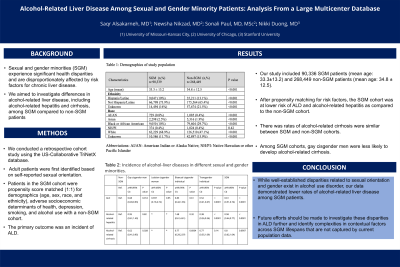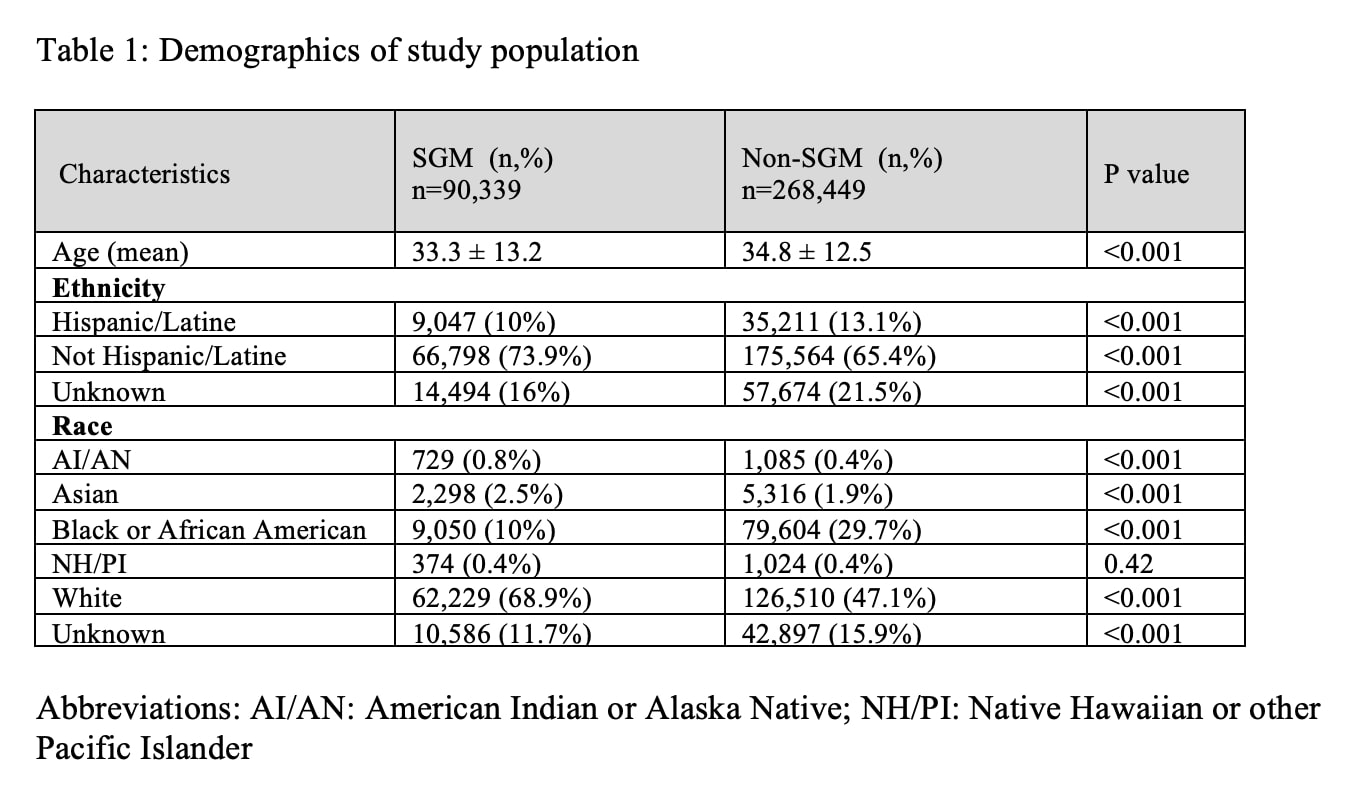Monday Poster Session
Category: Liver
P2952 - Alcohol-Related Liver Disease Among Sexual and Gender Minority Patients: Analysis From a Large Multicenter Database
Monday, October 28, 2024
10:30 AM - 4:00 PM ET
Location: Exhibit Hall E

Has Audio
.jpg)
Saqr Alsakarneh, MD
University of Missouri - Kansas City School of Medicine
Kansas City, MO
Presenting Author(s)
Saqr Alsakarneh, MD1, Newsha Nikzad, MD2, Sonali Paul, MD, MSc3, Nikki Duong, MD4
1University of Missouri - Kansas City School of Medicine, Kansas City, MO; 2The University of Chicago Medicine, Chicago, IL; 3University of Chicago Medicine, Chicago, IL; 4Stanford University, Kansas City, MO
Introduction: Sexual and gender minorities (SGM) experience significant health disparities and are disproportionately affected by risk factors for chronic liver disease, including alcohol use disorder. However, data regarding disparities in alcohol-related liver disease (ALD) among SGM patients are limited. This is the first study to investigate differences in alcohol-related liver disease, including alcohol-related hepatitis and cirrhosis, among SGM compared to non-SGM patients.
Methods: This retrospective cohort study used data from TriNetX research network over the last 20 years, from 2005 to 2024. Adult patients (aged >18 years) were first identified based on self-reported sexual orientation. Patients in the SGM cohort were propensity score matched (1:1) for demographics (age, sex, race, and ethnicity), adverse socioeconomic determinants of health, depression, smoking, and alcohol use with a non-SGM cohort. The primary outcome was an incident of ALD. The secondary outcomes were alcohol-related hepatitis and cirrhosis. COX proportional hazard models were used for analysis.
Results: Our study included 90,336 SGM patients (mean age: 33.3±13.2) and 268,449 non-SGM patients (mean age: 34.8 ± 12.5) [Table 1]. After propensity matching for risk factors, the SGM cohort was at lower risk of ALD (aHR: 0.61; 95% CI: 0.51-0.74) and alcohol-related hepatitis (aHR: 0.58; 95% CI: 0.44-0.77) as compared to the non-SGM cohort [Table 2]. There was rates of alcohol-related cirrhosis were similar between SGM and non-SGM cohorts (aHR: 0.8 0.62-1.04). Among SGM cohorts, gay cisgender men were less likely to develop alcohol-related cirrhosis (aHR: 0.62; 95% CI: 0.41-0.95).
Discussion: While well-established disparities related to sexual orientation and gender exist in alcohol use disorder, our data demonstrated lower rates of alcohol-related liver disease among SGM patients. Potential explanations for this include patient age, inadequate representation of intersectionally diverse SGM identities, and discrepancies in trust, language, and communication between SGM and clinicians. Nevertheless, this study is an impactful and necessary step toward increasing our understanding of disparities in alcohol-related liver diseases among SGM patients. Future efforts should be made to investigate these disparities in ALD further and identify complexities in contextual factors across SGM lifespans that are not captured by current population data.

Note: The table for this abstract can be viewed in the ePoster Gallery section of the ACG 2024 ePoster Site or in The American Journal of Gastroenterology's abstract supplement issue, both of which will be available starting October 27, 2024.
Disclosures:
Saqr Alsakarneh, MD1, Newsha Nikzad, MD2, Sonali Paul, MD, MSc3, Nikki Duong, MD4. P2952 - Alcohol-Related Liver Disease Among Sexual and Gender Minority Patients: Analysis From a Large Multicenter Database, ACG 2024 Annual Scientific Meeting Abstracts. Philadelphia, PA: American College of Gastroenterology.
1University of Missouri - Kansas City School of Medicine, Kansas City, MO; 2The University of Chicago Medicine, Chicago, IL; 3University of Chicago Medicine, Chicago, IL; 4Stanford University, Kansas City, MO
Introduction: Sexual and gender minorities (SGM) experience significant health disparities and are disproportionately affected by risk factors for chronic liver disease, including alcohol use disorder. However, data regarding disparities in alcohol-related liver disease (ALD) among SGM patients are limited. This is the first study to investigate differences in alcohol-related liver disease, including alcohol-related hepatitis and cirrhosis, among SGM compared to non-SGM patients.
Methods: This retrospective cohort study used data from TriNetX research network over the last 20 years, from 2005 to 2024. Adult patients (aged >18 years) were first identified based on self-reported sexual orientation. Patients in the SGM cohort were propensity score matched (1:1) for demographics (age, sex, race, and ethnicity), adverse socioeconomic determinants of health, depression, smoking, and alcohol use with a non-SGM cohort. The primary outcome was an incident of ALD. The secondary outcomes were alcohol-related hepatitis and cirrhosis. COX proportional hazard models were used for analysis.
Results: Our study included 90,336 SGM patients (mean age: 33.3±13.2) and 268,449 non-SGM patients (mean age: 34.8 ± 12.5) [Table 1]. After propensity matching for risk factors, the SGM cohort was at lower risk of ALD (aHR: 0.61; 95% CI: 0.51-0.74) and alcohol-related hepatitis (aHR: 0.58; 95% CI: 0.44-0.77) as compared to the non-SGM cohort [Table 2]. There was rates of alcohol-related cirrhosis were similar between SGM and non-SGM cohorts (aHR: 0.8 0.62-1.04). Among SGM cohorts, gay cisgender men were less likely to develop alcohol-related cirrhosis (aHR: 0.62; 95% CI: 0.41-0.95).
Discussion: While well-established disparities related to sexual orientation and gender exist in alcohol use disorder, our data demonstrated lower rates of alcohol-related liver disease among SGM patients. Potential explanations for this include patient age, inadequate representation of intersectionally diverse SGM identities, and discrepancies in trust, language, and communication between SGM and clinicians. Nevertheless, this study is an impactful and necessary step toward increasing our understanding of disparities in alcohol-related liver diseases among SGM patients. Future efforts should be made to investigate these disparities in ALD further and identify complexities in contextual factors across SGM lifespans that are not captured by current population data.

Figure: Table 1: Demographics of study population
Abbreviations: SGM: Sexual and gender minorities; AI/AN: American Indian or Alaska Native; NH/PI: Native Hawaiian or other Pacific Islander
Abbreviations: SGM: Sexual and gender minorities; AI/AN: American Indian or Alaska Native; NH/PI: Native Hawaiian or other Pacific Islander
Note: The table for this abstract can be viewed in the ePoster Gallery section of the ACG 2024 ePoster Site or in The American Journal of Gastroenterology's abstract supplement issue, both of which will be available starting October 27, 2024.
Disclosures:
Saqr Alsakarneh indicated no relevant financial relationships.
Newsha Nikzad indicated no relevant financial relationships.
Sonali Paul: Intercept – Grant/Research Support. TARGET PharmaSolutions – Grant/Research Support.
Nikki Duong indicated no relevant financial relationships.
Saqr Alsakarneh, MD1, Newsha Nikzad, MD2, Sonali Paul, MD, MSc3, Nikki Duong, MD4. P2952 - Alcohol-Related Liver Disease Among Sexual and Gender Minority Patients: Analysis From a Large Multicenter Database, ACG 2024 Annual Scientific Meeting Abstracts. Philadelphia, PA: American College of Gastroenterology.
